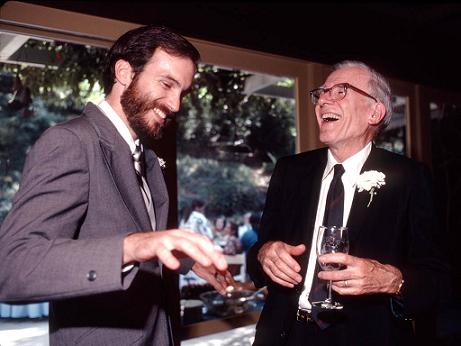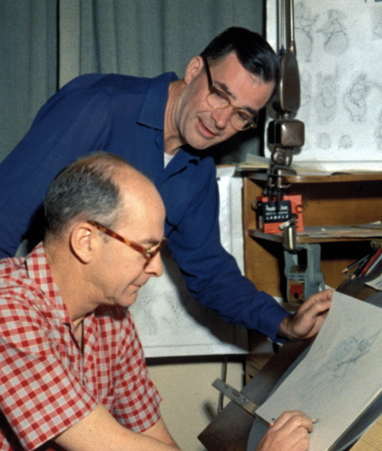In observance of Father’s Day, Ted Thomas has contributed this reminiscence about his “Disney Dad,” Frank Thomas.
I remember clearly a college break when I was helping my father with brush clearing at our family’s vacation cabin in the hills near Julian, California. I was in the middle of studies, but far enough along to be thinking about, and dreading, being out in the working world. My conversation with Frank that day centered on what was actually a lack of imagination on my part, where I complained about the prospects of what I saw around me—people working long hours in jobs they didn’t like, with commutes they didn’t enjoy, and counting the hours until they didn’t need to do it anymore. Job-hunting, from my limited perspective, looked pretty dreary, and I just couldn’t see myself spending so much time doing things I didn’t want to do.
Some parents at that point might have said something like, “Welcome to the world,” or, “Oh, grow up. What did you expect?” But Frank, with a blinding glimpse of the obvious, asked a question that went to the heart of my confusion, and, in the intervening years, has been very revealing to me about him and his employer, Walt Disney. Frank asked, “What if you were doing something you really liked? Would the hours matter, then?”

And how my father embodied that idea—with his art, his music, his family, his home—really, one could say, with his life. Except for serving in the Army Air Force in World War II, Frank spent his professional life working with Walt and the Studio, from 1934 until his retirement in 1978, and then via writing books, lecturing and consulting right up until his passing in 2004. Like many great relationships, it’s a complicated matter to try and separate out what Frank contributed to the culture and films of the Studio, and the ways in which he was personally influenced by working with Walt—the thoughts and values that he brought home and passed along to his family. But, I think that each of my siblings would agree that a day doesn’t go by that we don’t think of the influence of our father on us, and by extension, Walt and the Studio.
As a child I first became aware that my father was an artist, and an animator, at our birthday parties. At the time there was a lending library of 16mm prints of the Studio’s animated films, and employees could borrow them for family screenings. So, I had knowledge of the films and what my father had done in them from a fairly early age. To catalogue my favorite work is almost impossible, but I guess that a short list would include: Mickey and Minnie in Brave Little Tailor, Bambi and Thumper on the ice, the entire Squirrel sequence from The Sword in the Stone, and Baloo and Mowgli in The Jungle Book.
… And this leaves out Pinocchio in the puppet show, or Lady and Tramp eating spaghetti, or Captain Hook, or Cinderella’s stepmother, or the three good fairies, and so on. There are four decades of standout work, and to measure the depth of feeling, sincerity, humor, and pathos in the scenes is to get a measure of Frank.
I was at opening day of Disneyland, but my three-year-old’s recollections are mostly of hot asphalt and being eye-high to people’s belt buckles. As the years went by I visited the Studio often, and the Park regularly during the summers when Frank played with the Firehouse Five Plus Two. My feeling about both was of fun places where you could learn how to put on a show. That’s because both had this aspect of seeing the finished product, what it was the audience got to enjoy, and the privilege of being behind the scenes and soaking up the logistics, talent, craft, and personalities involved in putting it all together. This was when Disney’s was still a fairly small operation. Everyone was on a first-name basis at the Studio, and the Park was in its first decade or so.
I met and chatted with Walt a handful of times—at a Christmas party, a Zorro wrap party, and twice at Disneyland. We had a conversation about Vaudeville at the first event; the others were social situations or shaking hands and saying “hi.” But, in truth, he was at our family dinner table regularly. A story about what happened at the Studio, or what Walt had said or done or wanted to do, was part of the nightly discussion.
And then there was the day in December of 1966, when we came home from school and Frank was there, and our mother urged us to be quiet and leave him alone because Walt had died that morning.

Frank brought a level of craft and acting to animation that Walt wanted and needed in order for audiences to truly suspend disbelief and enter the emotional life of characters. He set the bar so high that few have equaled it and none have surpassed it. Frank also had the ability to continue to develop and refine a bit of business or a scene way beyond an initial concept. It was a trait that meshed very well with Walt’s desire to explore and push the boundaries of the medium. The great concept artist Ken Anderson once told me that Walt described Frank as his “Abraham Lincoln.” I’m not enough of a Lincoln scholar to guess what Walt meant by that, but I’m thinking that it was in a good way.
For a long time, the Studio’s fortunes were such that the animators didn’t know if they would have a job from picture to picture. Even so, my father was aware that there was no other place or studio where he would have the creative challenges and opportunities that he did working with Walt.
My father had a boundless curiosity. He felt that Walt did, too.
My father was a perfectionist, and wanted to make things the best that they could be. He thought Walt did, too.
My father was impressed that Walt was constantly thinking and coming up with ideas twenty-five hours a day.
My father often said that, when faced with something new or different, Walt’s comment was, “I wonder what we can do with this?” He had a sense of the potential of an idea, technique, or technology well before there was an apparent need or application for it.
My father was taken by the fact that Walt only involved himself in things that he really wanted to do, and then he expected the same level of enthusiasm from everyone around him.
Which brings me back to the conversation that Frank and I had when I was in college, and I took to heart. “What if you were doing something you really liked?” There are so many aspects of my own work process that I acquired from Frank and the way that he and his colleagues worked with Walt…from a sense of entertainment, to ways of exploring story, to how to “plus” a project, to how to have fun while working, and the pleasure of working hard.
Theodore Thomas is an American motion picture director and producer. He is the son of the late Disney animator Frank Thomas. His films include Where the Toys Come From (1984), a documentary about two of Disney's “Nine Old Men,” Frank and Ollie (1995), and Walt & El Grupo (2009), documenting Disney and his group visiting South America in the summer of 1941.
Images above: 1) Ted and Frank sharing a story on the younger Thomas's wedding day, June 1981. © Theodore Thomas. All rights reserved. 2) Frank Thomas (right) with lifelong friend and collaborator Ollie Johnston, 1959. © Disney.
